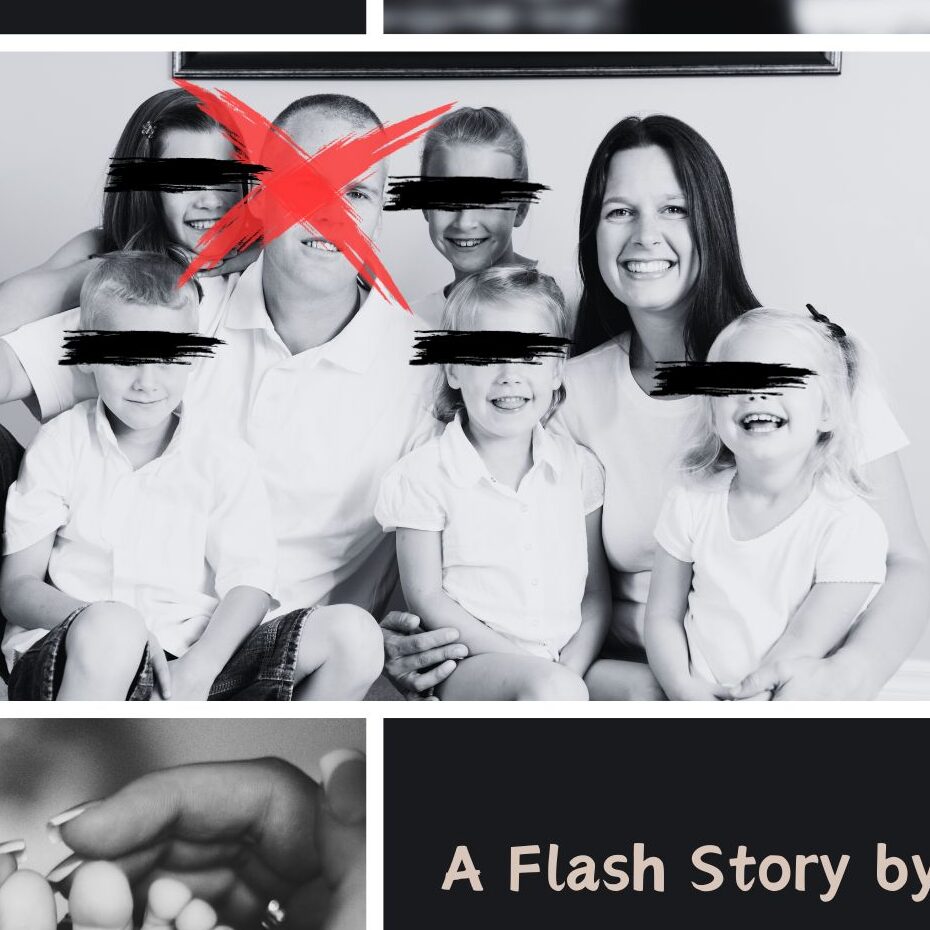Bob Jensen pulls into the Airport Motel parking lot and curses his luck. He slams the truck into park and fishes in his pocket for his phone. The thunderstorm threatened by KIRO radio news has begun to unleash and the thumping of the wipers keeps time with his pulse. He is sweating.
He looks at the screen. “Two oh six,” he mutters. “Two, oh, six. That’s Seattle, right?” He punches the phone icon, sees the missed call, and waits. Bob Jensen has only had his phone for a few months, but he knows enough to wait for the voicemail notification.
“Ding.”
He takes a deep breath and presses play. Bob Jensen is listening to the most important voicemail of his entire adult life.
—
Fifty yards away, wrapped in a rust-colored bedspread smelling of stale cigarette smoke, Gail Kenwood peeks out of the motel room window. She’s biting her lip, she always bites her lip when she’s nervous. She squints through the rivulets of rain on the window and tries to see the truck. The headlights glare in the water, but her gut tells her it’s him.
“It’s him,” she says. She pulls the bedspread tighter around her small cold body. “I can feel it.”
“You’re being paranoid,” comes a voice from the bed. “There’s no way he’d know we’re here. It’s not like he knows me or my car.” Andrew, his name is Andrew, pats the bed and beckons Gail back.
“Let’s pick up where I left off,” he says.
Gail frowns looking at the truck in the parking lot. She shifts her weight from foot to foot, looking like a small child with a full bladder. The move makes Andrew laugh and his laughter only heightens her anxiety.
“You don’t know him. He could have followed me,” Gail said, narrowing the opening in the curtains until only her eye could be seen by a passerby. There are no passers-by.
“He could have been following me all this time. He’s very smart.” She turns to Andrew, real fear in her face, and says, “Maybe he put one of those GPA thingies in my car. He can track me from anywhere.” She whimpers—an unattractive sound—and turns back to the window. She takes a few steps back but continues to watch.
GPA? “You mean GPS. Look, Gail,” he rises from his side of the bed naked, and walks over to her. “You really are being silly.” He places his hands on her bare shoulders and kisses the back of her neck. “Come back to bed.”
Her shaking makes him straighten up. “Let me have a look,” he says, pushing Gail aside gently. He sees the truck on the far side of the parking lot, lights blaring, wipers moving, and tries to make out the license plate. Mother Nature shines a long flash of lightning on the scene, but it is of no narrative help. The headlights throw too much glare onto the motel.
“Why’s he just sitting there,” Andrew asks. Thunder roars in a dramatic answer.
—
Bob Jensen is taking deep breaths. He has listened to the voicemail at least three times and vows to figure out how to save those suckers forever. A mid-size game company in Seattle wants to hire him as a marketing manager for their new premium game line. They are very excited to have him on board. Shelly in Human Resources said so in the message. He is free to call back anytime before six p.m. to make arrangements for his start date.
Bob Jensen looks at his watch and curses, though for Bob Jensen “dang it” is a curse, so, while all levels of cursing are relative to the curser and the listener, the intensity of the curse is irrelevant. What is relevant is that Bob Jensen has forgotten about the three-hour time difference between Philadelphia and Seattle. He is slowly realizing his mistake…
“Oh, yeah. Dummy!”
…now.
Bob Jensen returns Shelly in Human Resources’ call.
—
“I don’t get it,” Andrew said. “Why is he just sitting there? If it is him, I mean.”
Gail thumps his shoulders with both hands. “It is him. It IS!” She stumbles back to the bed and flops down, her feet tangled into the bed sheet. She puts her hands on her face and starts to sob.
Technically, she is only pretending to sob, but Andrew does not know this. Andrew has only known Gail for about two months and hasn’t gotten a full read on her yet. Andrew keeps looking out the window, shaking his head. He is not sure what to believe.
“Just sitting there…”
“He is going to kill me,” Gail says this not as a plea, but as a statement. She is reading a line in a play. She is calculating how much fear and seriousness she is to put into the delivery of this line. She is shaking her shoulders in a pathetic, but minimal way because too much shoulder shaking is a sure sign of fake tears. She bends lower at the waist, deepening her sob. She is pleased that the real tears have finally come.
Andrew is distracted. Andrew does not have a cell phone or participates in the Internet at all. Andrew thinks that being a Luddite is the epitome of intellectual elitism. Andrew is an ass.
Andrew also has no context to think that this truck is just some guy pulled over to talk on his phone.
Andrew is also currently being manipulated by Gail, the amateur actress. He turns back and watches her.
Gail is good. She lets the bedspread fall to her waist and holds her arms slightly akimbo so that as she is wracked with sobs, her breasts heave mightily. Andrew believes himself to be an intellectual, but he is a man first and a man stands no chance against a rack wracked.
“Please, Andrew,” Gail says into her palms. “I’m so scared.”
Andrew leaves the window and approaches the bed, she stops him from sitting next to her, raising her hands to him, and grabbing his hands in hers. “Wait. I have to think. I have to stay clear.”
Her face is wet, her breasts are firm and gorgeous and her strong arms are outstretched before her. Her face, her wet, pleading face is level with his waist, with his…
There is no hope for Andrew here, so you may as well stop rooting for him now.
—
Bob Jensen laughs into his phone. “No, thank you, Shelly. It’s excellent news.” He looks into the rearview mirror and smiles at himself.
“Yes, yes. I’m really looking forward to getting started.” He winks at his reflection. He is thinking of asking Shelly out for dinner once he’s finally settled in Seattle and if it’s not against his new company’s policy. “I can’t wait. I’ll see you in a week. Thanks again.”
Bob Jensen is beaming brighter than his damn high beams that have been shining into the window of number 14 for the last ten minutes.
—
Back in number 13, Andrew is trying to deal with a hysterical girlfriend, a homicidal husband, and a massive erection all at the same time. Andrew is failing on all fronts.
“You said it yourself,” Gail said, grabbing his waist. “Why is he just sitting there? It’s hummus, like a bull waiting to charge.”
Andrew looks up from Gail’s breasts to work out what she said.
Hummus? he thinks. The confusion is doing a wonder on controlling his libido.
“Ominous?” he says, one eyebrow raised. Andrew raises his eyebrows when he’s trying to win a debate with condescending arguments, suggest a sexual encounter with a knowing woman, or suss out what some fool is trying to say. You decide for yourself which situation this is now.
“Whatever,” Gail says. “I’ve told you about the guns and stuff. I’ve told you how it is with him.”
“Well, sure,” Andrew says, tilting his head toward the window and pointing his arching eyebrow at the truck. “But, well, that was all hyperbole, wasn’t it? Something to tell me to make this little fling more… dangerous?” Andrew stops believing the words coming out of his mouth the moment he says them. I’ve found myself in a lame romantic thriller,’ he muses. He just thinks this to himself, but Andrew is the kind of person who likes to think he muses.
“This isn’t a damn novel,” Gail says, shaking him. “My homicidal and extremely jealous husband is in the parking lot, right this minute, probably waiting to make sure it’s me before he comes in and kills you. What are you going to do about it?”
Andrew stops musing immediately. “Whoa, whoa, whoa, lady.”
And it is this utterance of the word “lady” that breaks all bonds, romantic and lustful, between Andrew and Gail.
—
Bob Jensen smokes a cigarette and dreams about his upcoming move. The thunderstorm is starting to get its feet under it and pours rain down on his truck. He is making a mental checklist of all the packing he needs to do in the next few days. He frowns when he remembers that he has to give his beloved Pekingese, Shushu, to his sister for a while. But he knows she’ll settle in better after he’s sure he’s found a good place with a yard. She loves running around in the yard.
Shushu, not Bob Jensen’s sister. Though, I could be wrong about the sister.
He turns on the radio and lip-syncs to Jon Bon Jovi’s “Blaze of Glory.” Lightning illuminates the parking lot before him, but his head is thrown back in mimicked stage presence and he can’t see anyone approach the truck.
—
“You have to do it,” Gail says, gripping Andrew’s shoulders. The bedspread lays forgotten on the floor and she stands before him, in all her glory, turning up the intensity, willing her bloodlust to flow from her fingers and penetrate his skin.
Andrew is having none of it.
“Look, look,” he says, holding up his hands and looking for his pants. “It’s been fun, but I didn’t sign up for this shit. This is too much drama even for me.”
Gail laughs and Andrew has a split second of insight that would have taken him months to realize in a normal affair. Gail is bat shit.
“You think I’m crazy,” she says, “but I love you. Don’t you want us to be together?”
Andrew finds his pants and slides them on like a fireman. “Oh, no, no no.” He grabs his shirt and shoes, leaving his underwear and socks as a sacrifice to the Crazy Bitch Gods. “No, no, no, no no.” He turns his back toward the door, not wishing to turn his back on Gail, and checks his pants for his wallet. Andrew is ready to go.
“I’m leaving. You deal with your crazy husband. You two deserve each other.” He reaches for the doorknob and turns. A door slams outside. Andrew turns and stares at the doorknob in his hand. He stops breathing. He listens. Footsteps.
“Aaiiiiiiiyyyyyyyyeeeeeeee,” yells Gail and launches onto his back. She digs her nails into his cheeks and tries to pull him away from the door. Andrew reaches up with his empty hand, not wishing to open the door to the horror on the outside, and deals with the horror on the inside half-assed. He reaches behind himself, grabs a clump of Gail’s hair, and pulls.
She screams and releases his face, but then lurches forward sinking her teeth into his shoulder. Andrew bites his tongue and rams his head forward into the door. He is trying to shake the beast off, but he is failing. She wraps her legs around his waist and pulls him backward with her weight.
Andrew lets himself fall back onto the floor and lands full force on top of her. She grunts when the air is knocked out of her and releases her grip. Andrew scrambles back up and doesn’t take the dramatic turn to look back and offer a witty quip to her prone form. He just wants to escape from crazy town and launches himself through the open door.
Andrew realizes his mistake in three, two…
—
Bob Jensen is really belting out his song without uttering a sound. He’s writhing back and forth in his seat while the storm gives him thunderous applause. He hammers on his steering wheel, drumming to the music and the tremors shift his phone from the dashboard to the floor. Seeing the messenger of his success glowing in the heaps of detritus on the floor, he leans over to retrieve the device. His eyes glide over the man approaching the truck, arms raised in alarm. Bob Jensen grabs his phone and drops it again, stunned by a large crack sending his truck swaying.
“That was close,” Bob Jensen says, sitting back up and pushing up his glasses. He focuses on the bullet hole in the windshield and frowns.
“What the…”
—
Andrew skids to a halt when he sees the man raise his gun. He stands stupidly in the blare of the truck’s headlights as the first shot is fired. His first thought is How many boyfriends does Gail have? as the man shoots again.
The second shot breaks Andrew out of his shock and he shuffles away from the scene, keeping his eyes on the shooter. It’s tough going for him, as the condition of the motel parking lot is not conducive to barefoot walking. He steps on a piece of glass and yelps.
The gunman turns toward the sound, weapon raised.
Andrew drops his shoes and shirt and raises his hands. “Look man, nothing to do with me.”
The gunman tilts his head and stares at Andrew. “Just trying to get some sleep man,” he says.
“All good, all good,” Andrew says, trying to sound reasonable and failing. He is suddenly aware of how thoroughly soaked he is. He shivers.
“I’m going to leave and let you get some sleep,” he smiles. Andrew has always thought his smile disarming.
“Been on the road for days, just need some sleep,” the gunman says. He nods toward the truck. “Then those damn lights, right in my window. Not right.”
“I get you, man,” Andrew says and believes he’s found some ground to stand on. “I was about to take care of this jerk myself, but you’re faster. It’s all good now.” He inches forward, toward the truck, farther from the gunman.
“How about I switch off those lights, man.” Andrew smiles.
The gunman shoots out the headlights on the truck.
Andrew jumps and cowers. His disarming smile appears on his face as the gunman turns back to him.
“You got it, man, you got it,” Andrew says, the rain streaming down his face and body, his khaki pants plastered to his legs. He keeps smiling and closes his eyes.
The gunman turns away from Andrew and walks back to his room, head drooping, rain spilling off the rim of his baseball cap.
Andrew dares not to move and can you blame him? He promises himself to spring away, broken glass or no broken glass, the moment the gunman is out of sight. His legs tense in anticipation.
The gunman reaches his door and turns the knob.
The door to number 13 opens and Gail shouts “What the hell is all the noise?”
She is looking at Andrew as the bullet pierces her skull, shattering the annoyed look on her face into thousands of pieces. As her body falls, Andrew sees the gun barrel smoking and thinks They really do smoke, before he pees into his sodden pants. He drops to his knees.
“Please, man, pl..”
The gunman fires a single shot and goes back into his room.
—
Bob Jensen’s phone rings. It is Shelly from Human Resources. She has just one more question.








